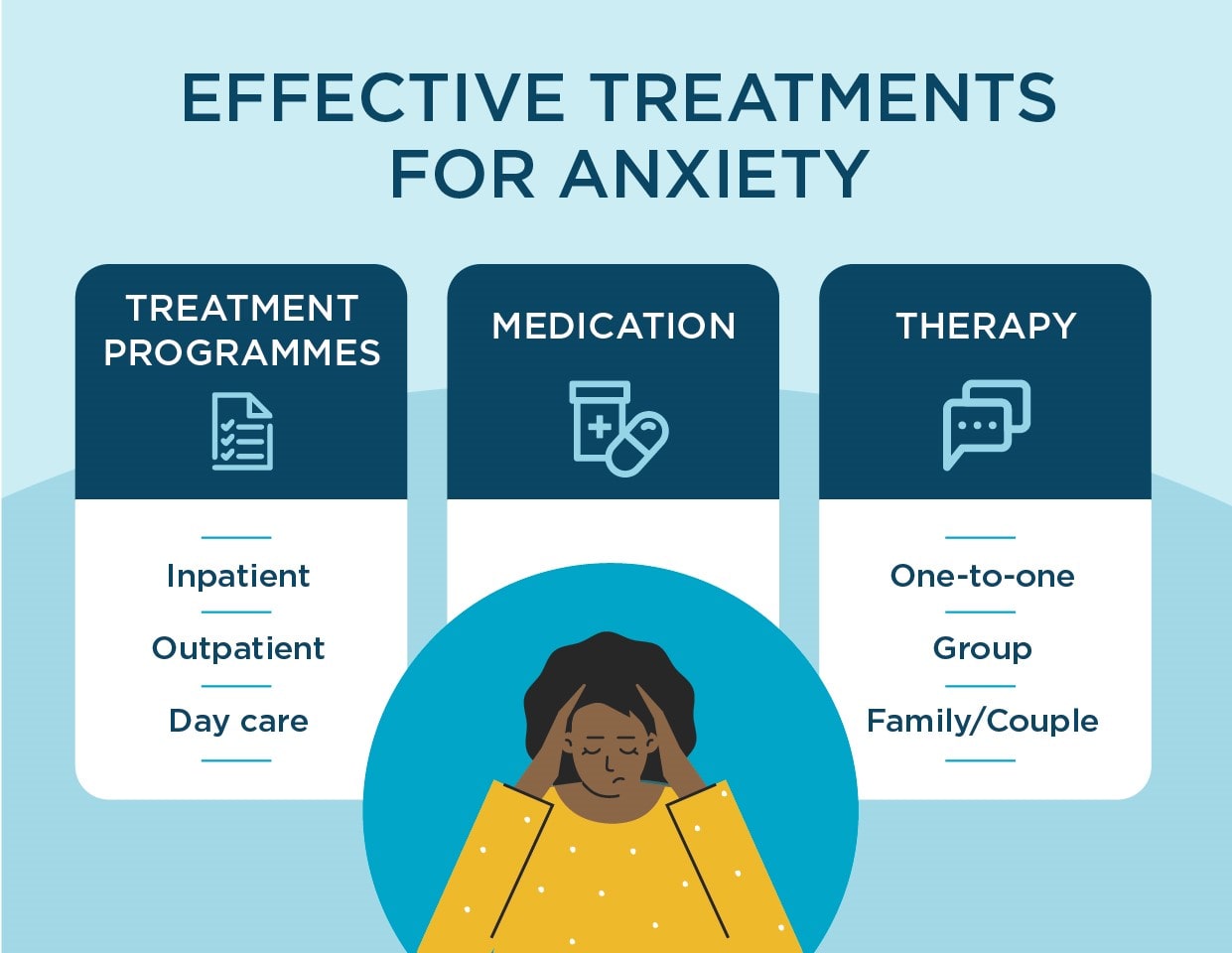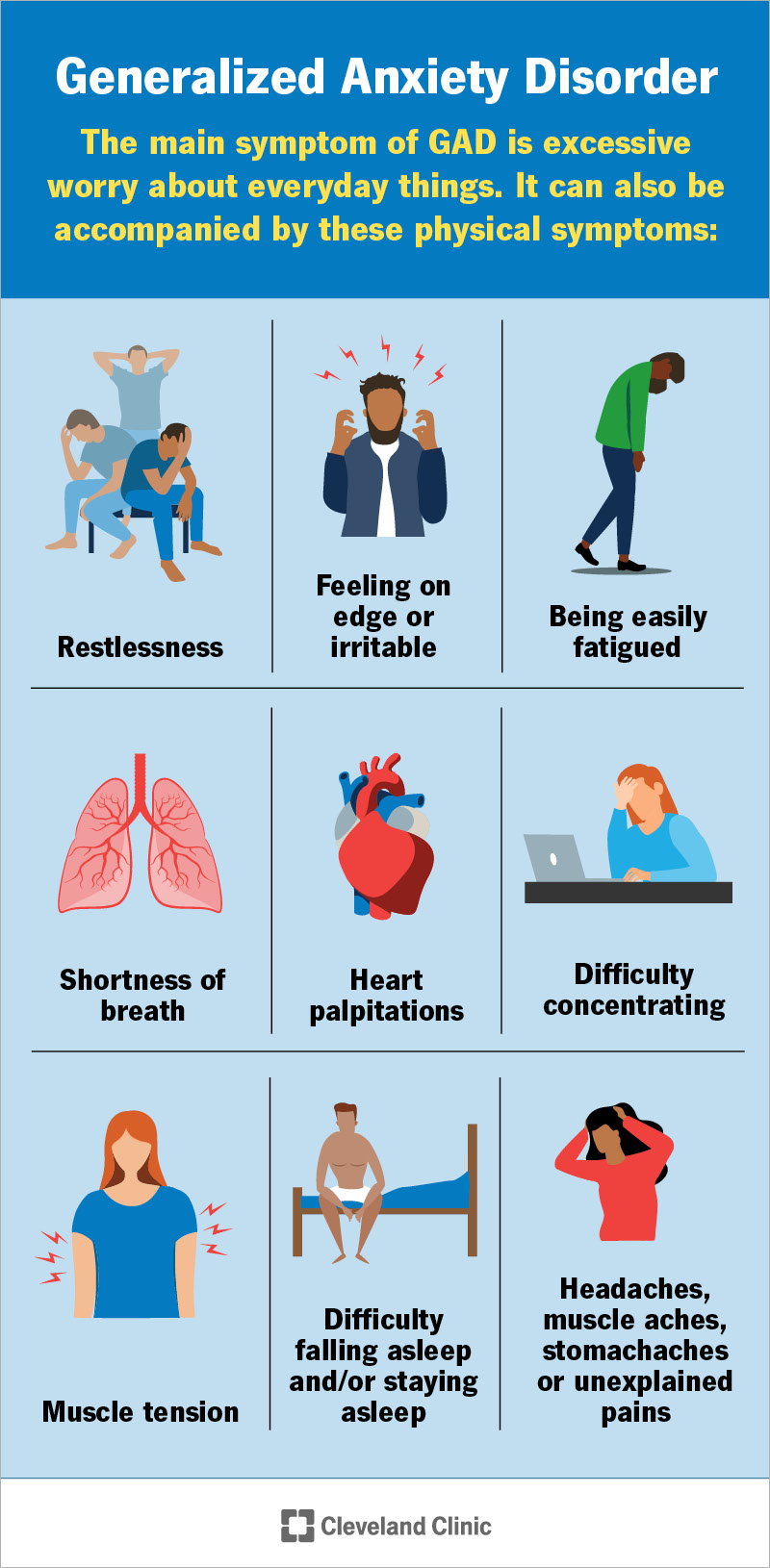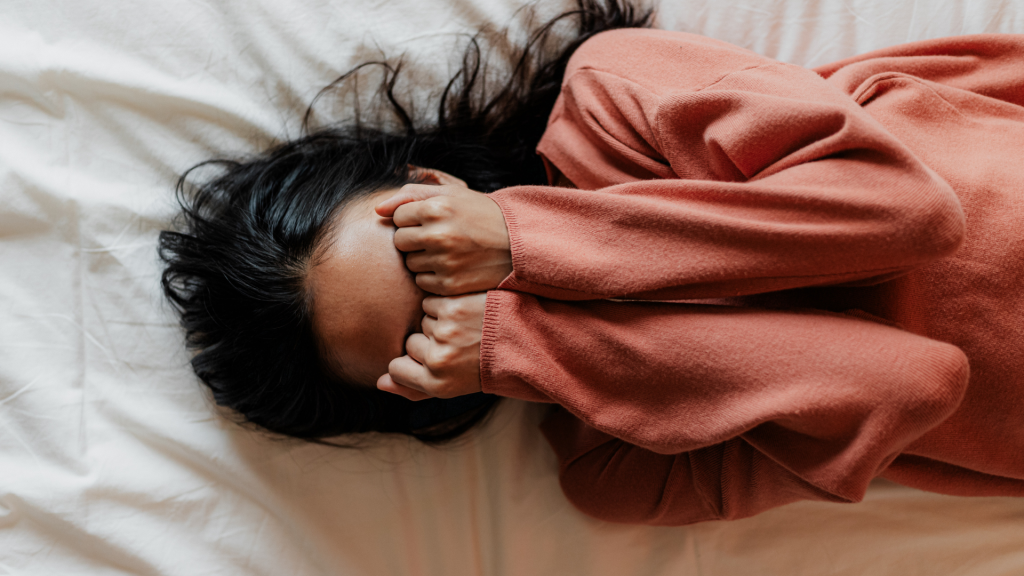Exploring Different Strategies in Therapy for Stress And Anxiety Disorder for Long Lasting Change
When taking on anxiety conditions, it's vital to explore a range of therapy approaches. Each approach uses special insights and tools to assist you handle your signs properly. You might find that incorporating strategies can produce the most effective results. Nonetheless, understanding the nuances of these methods is vital to fostering lasting adjustment. What if the appropriate combination could release a new level of emotional health for you?
Comprehending Anxiety Problems: A Quick Review
Anxiousness conditions, which affect millions of individuals worldwide, can greatly influence life. You may experience frustrating sensations of fear or worry that seem uncontrollable. These sensations can cause physical symptoms like an auto racing heart, sweating, or even dizziness. Usual types of anxiety disorders include generalized anxiety condition, panic attack, and social stress and anxiety condition. Each has one-of-a-kind signs, but they all share a propensity to disrupt your routine and relationships.Understanding the source of your anxiety is vital. It could stem from genes, mind chemistry, or life experiences. Recognizing your triggers can aid you manage your responses better. It is very important to keep in mind that you're not alone in this battle. Several people face similar difficulties, and seeking help is a strong action towards feeling better. By discovering concerning anxiety problems, you're currently on the course to understanding and handling your problem better.
Cognitive-Behavioral Therapy: Testing Adverse Thought Patterns

Identifying Unfavorable Thought Triggers
When you run into moments of distress, acknowledging the details triggers behind your unfavorable thoughts can be vital in managing anxiety. Start by taking notice of situations that prompt feelings of fear or concern. Is it a crowded space, an approaching due date, or a conversation with certain people? Take down these instances in a journal. This will assist you identify patterns in your reasoning. Notification physical feelings that accompany your unfavorable thoughts, like a racing heart or rigidity in your breast. By pinpointing these triggers, you acquire understanding right into what's sustaining your anxiousness. Recognizing these links is the initial step in testing those thoughts and ultimately restoring control over your psychological responses.

Changing Thoughts With Positives
Challenging adverse idea patterns is a crucial action in transforming your state of mind and minimizing stress and anxiety. You may often find yourself entraped in cycles of self-doubt or catastrophic thinking. Rather than letting these ideas dictate your feelings, method replacing them with sensible choices or positive affirmations. When you think, "I can not manage this," change it to, "I can handle challenges one action at a time." This easy change can substantially affect your mood. Routinely recognizing and countering these adverse thoughts helps develop a healthier internal dialogue. Bear in mind, it takes some time and effort, however regularly exercising this technique can bring about long lasting adjustment, equipping you to encounter stress and anxiety with restored confidence and durability
Building Coping Approaches Together
Changing adverse thoughts is only the start of managing stress and anxiety properly. To create enduring adjustment, you require to build coping techniques that encourage you. Cognitive-Behavioral Therapy (CBT) helps you determine and test those unhelpful thought patterns. Together, you and your counselor can check out just how these ideas effect your feelings and behaviors.Start by establishing sensible techniques, like journaling or mindfulness exercises, that allow you to face stress and anxiety head-on. When you encounter your anxieties progressively, you'll learn to respond in different ways.

Mindfulness and Acceptance-Based Approaches: Growing Present-Moment Recognition
As you browse the intricacies of anxiety, integrating mindfulness and acceptance-based techniques can substantially enhance your capability to grow present-moment recognition. By concentrating on the present moment, you'll locate that you can observe your ideas and sensations without judgment. This method assists you acknowledge your anxiety without feeling bewildered by it.Engaging in mindfulness workouts, such as deep breathing, body scans, or assisted meditations, allows you to ground yourself in your existing experience. Acceptance-based approaches urge you to accept your emotions rather than fight versus them. They lose their power over you.Incorporating these practices right into your day-to-day regimen can change exactly how you react to anxiousness when you accept your feelings. You'll create strength and find out to browse demanding circumstances with higher simplicity. Inevitably, cultivating present-moment recognition lays the structure for long-term change, equipping you to lead a more meeting life.
Exposure Treatment: Facing Fears Progressively
Exposure treatment helps you challenge your concerns in a progressive way, making it much less overwhelming. You'll find out methods to face anxiety-provoking scenarios step by action, while also constructing coping methods to manage your responses. This method encourages you to take control and minimize stress and anxiety gradually.
Progressive Direct Exposure Strategies
When encountering stress and anxiety, progressively confronting your concerns can be an effective way to gain back control. This strategy, referred to as progressive exposure, includes slowly revealing on your own to the situations or items that cause your anxiousness. Start with less intimidating situations and progressively function your way up to more difficult ones. If you're terrified of public talking, you could begin by talking in front of a mirror, then advance to sharing thoughts with a pal, and ultimately attend to a little group. Each step helps desensitize you to the fear, building your confidence over time. Bear in mind, it's vital to speed yourself and celebrate small victories as you move through this process, reinforcing your capacity to take care of stress and anxiety successfully.
Building Coping Techniques
Building reliable coping approaches is important for handling anxiety, especially as you challenge your worries progressively. One powerful approach is direct exposure therapy, where you start by facing your anxieties in a regulated manner. Begin with less frightening circumstances and slowly function your means approximately even more difficult scenarios. This steady exposure helps desensitize you to stress and anxiety sets off, making them much less overwhelming.Incorporate leisure techniques, such as deep breathing or mindfulness, to soothe your mind during direct exposure. Track your progression, commemorating little triumphes in the process to improve your confidence. Remember, it's all right to take your time; the objective isn't excellence however steady enhancement. By developing these methods, you'll empower on your own to browse anxiousness and accept life extra fully.
Psychodynamic Therapy: Discovering Source of Anxiety
Psychodynamic treatment discovers the subconscious mind, exposing the source of your stress and anxiety - Counseling services for anxiety. By analyzing your thoughts, sensations, and past experiences, this method assists you reveal underlying disputes and unsettled problems that might contribute to your present stress and anxiety. You'll deal with a therapist to explore youth experiences, relationships, and emotional patterns that form your feedbacks today.As you obtain understanding right into these deeper layers of your mind, you'll begin to acknowledge just how previous events influence your present habits. This understanding can result in catharsis, permitting you to refine emotions you could have suppressed.Through the healing partnership, you can also determine defense systems that might have created in time, providing a clearer path to change. Ultimately, psychodynamic therapy furnishes you with the tools to address your anxiety at its core, promoting long lasting improvement in your psychological health
Integrative and Holistic Methods: Integrating Strategies for Greater Efficiency
Integrating different restorative strategies can boost your journey toward managing anxiety more efficiently. By combining components from cognitive-behavioral therapy, mindfulness techniques, and all natural techniques, you can produce an individualized technique that resolves your special needs. You might utilize cognitive-behavioral strategies to challenge adverse thought patterns while including mindfulness exercises to ground on your own in he said the existing moment.Additionally, exploring all natural practices such as yoga exercise or meditation can advertise relaxation and minimize anxiety symptoms. This mix allows you to establish greater self-awareness and resilience.Experimenting with these diverse approaches can help you uncover what reverberates most with you. Remember, it has to do with discovering a synergy that functions, instead of staying with a solitary strategy. This integrative strategy not only uses prompt alleviation yet also fosters long-lasting skills for handling stress and anxiety, encouraging you to redeem control over your life.
The Duty of Assistance Equipments: Structure Resilience Through Connection
While it might seem that handling anxiousness is a singular trip, having a solid assistance system can play a vital duty in your durability. Surrounding yourself with compassionate good friends, family members, or assistance teams produces a risk-free space where you can honestly share your experiences and feelings. When you connect with others, you remind on your own that you're not the only one in this struggle.These partnerships use inspiration and can give functional coping methods that have worked for others. It's also a chance to get point of view; good friends can assist you see situations in different ways, minimizing feelings of isolation.Moreover, psychological support cultivates a sense of belonging, which can greatly relieve stress and anxiety symptoms. By leaning on your support group, you can develop durability and take on challenges extra efficiently. Keep in mind, reaching out for help suggests strength, and it can make all the difference in your trip toward taking care of anxiety.
Regularly Asked Questions
What Are the Typical Symptoms of Stress And Anxiety Problems?
You might experience uneasyness, exhaustion, difficulty focusing, irritation, muscle tension, and rest disruptions. Physical symptoms can consist of quick heartbeat, sweating, and trembling. Acknowledging these indicators early can help you seek proper assistance and treatment.

The Length Of Time Does Treatment Generally Last for Anxiousness Problems?
Treatment for stress and anxiety disorders normally lasts anywhere from a couple of weeks to several months. It really depends upon your private requirements, development, and the strategies your specialist makes use of to aid you handle your stress and anxiety successfully.
Can Medicine Be Made Use Of Along With Treatment for Anxiousness?
Yes, medicine can most definitely be Bonuses made use of along with treatment for anxiousness. Integrating both techniques usually boosts therapy efficiency, assisting you manage symptoms while exploring underlying concerns via therapy. Always consult your healthcare provider for personalized advice.
Exist Self-Help Approaches for Taking Care Of Stress And Anxiety?
Yes, there are a number of self-help techniques for managing anxiousness. You can practice mindfulness, take part in normal exercise, maintain a well balanced diet plan, establish a regular, and make use of deep breathing methods to help lower stress and anxiety symptoms properly.
Exactly how Do I Know if I Required Expert Help for Anxiousness?
You ought to take into consideration seeking professional help for anxiousness if it disrupts life, triggers substantial distress, or if self-help techniques aren't functioning. Count on your reactions; connecting can cause better coping skills and support. Usual types of anxiousness disorders consist of generalised stress and anxiety condition, panic problem, and social stress and anxiety problem. When you experience minutes of distress, recognizing the certain triggers behind your adverse thoughts can be necessary in managing stress and anxiety. Changing adverse thoughts is only the beginning of handling anxiousness effectively. By examining your ideas, sensations, and previous experiences, this approach helps you discover underlying disputes and unsolved concerns that might contribute to your current stress and anxiety. It's likewise an opportunity to gain perspective; good friends can assist you see situations differently, decreasing feelings of additional reading isolation (Counseling services for anxiety).Moreover, emotional support promotes a sense of belonging, which can considerably relieve anxiety symptoms